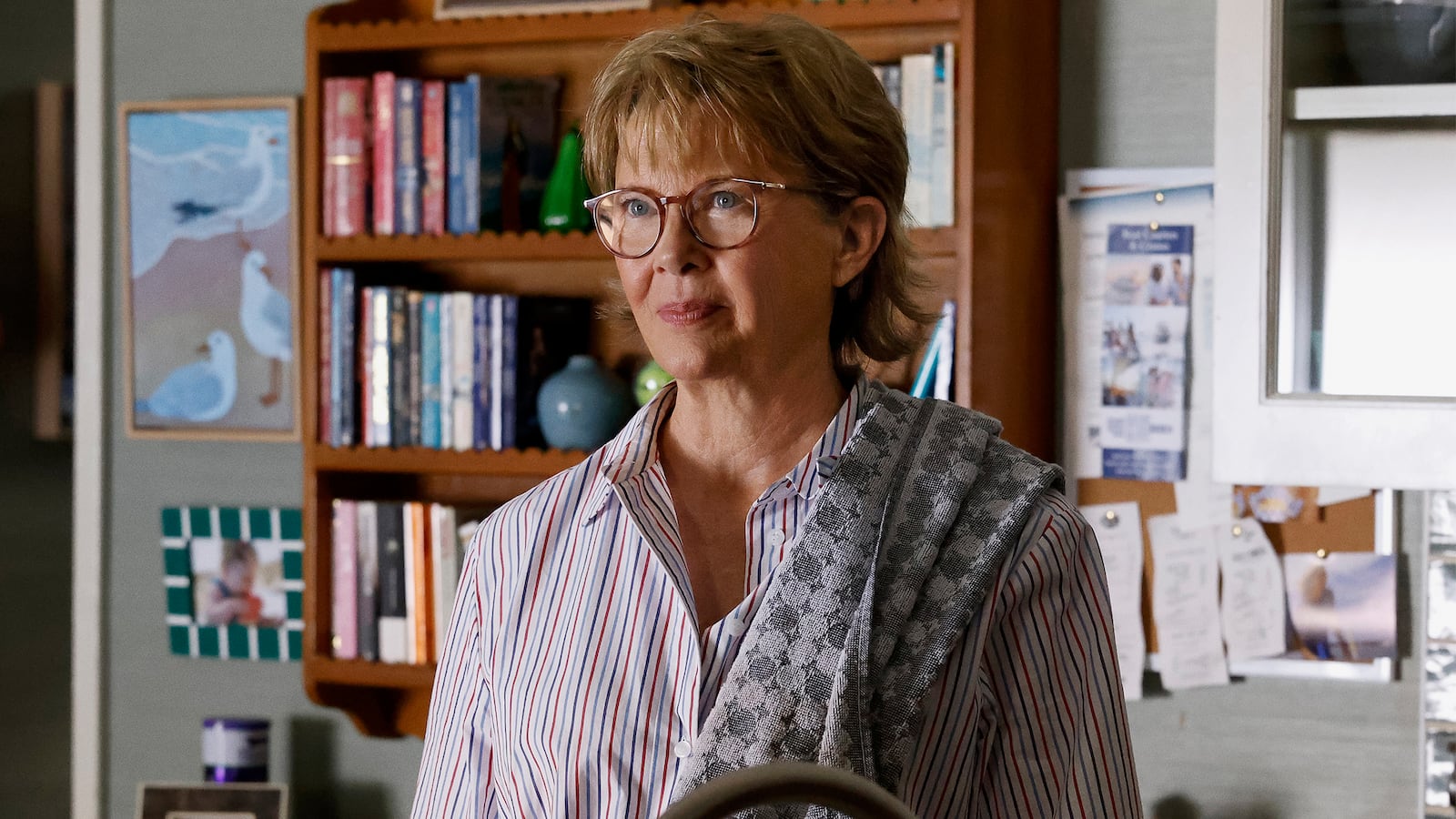Joy Delaney is a woman people don’t see—until she goes missing.
She juggled so much for so long that when folks stopped needing her, they stopped seeing her. Then, she actually vanished.
The tale of a family of athletes, an enduring love story, and a murder mystery made Liane Moriarty’s exquisite Apples Never Fall a bestseller. Moriarty knows her way around the shadows cast in a long marriage and the rivalries that drive family dynamics.
“Amy once told Joy that she had no idea how lonely it felt to be single,” Moriarty (Big Little Lies) writes about the elder daughter talking to her mom. “Joy had wanted to tell her that you could still be lonely when you were married, that there had been times when she had woken up day after day crushed with loneliness, and still made breakfast for four children.”
Interior reflection plays out beautifully in a long novel but doesn’t always translate to the screen. Yet the seven episodes of Apples Never Fall, streaming on Peacock March 14, reflect the characters’ inner turmoil. Directors Chris Sweeney and Dawn Shadforth crafted a sharply focused portrait of a family, specifically of the woman at its center.
In some ways, Apples Never Fall is a natural progression to Big Little Lies, looking at a woman’s life after the time depicted in the HBO series. Sure, there’s a crime thriller at its heart, but a more universal, existential question is posed. What happens in the space after women are no longer identified strictly as mothers? Who are you then?
Annette Bening, also an executive producer, turns in a stunning performance as Joy. A gifted tennis player, Joy abandoned her dreams and married young to another rising tennis star. A fierce competitor, even now, Stan (Sam Neill) is incapable of turning off that drive. Meanwhile, Joy ran the family’s tennis academy, raised four kids, and stayed in a 40-year marriage.
As someone in a 40-year marriage and with adult children, I relate to Joy. Joy’s not sure of her next chapter but trusts there is one. She knows her kids’ desires but not her own. Lately, her default mood is being pissed off; everyone seems to take her for granted.

Annette Bening and Jake Lacy
Vince Valitutti/Peacock“Here’s the thing no one tells you about marriage, about family—how much you can resent those you love for everything you had to give up for them, and there’s never even a thank you,” Joy says in a gripping scene.
“You just give it all up because that’s what having a family demands of a woman,” she continues. “And then you wake up one day, and you realize that the person you were meant to be is gone, and you gave her up for the people who don’t even see you, and there’s no time to grieve because there’s too much damn laundry. You just wake up one day, and you realize that half of you, maybe the best part of you, is dead, and you take it for granted that when push comes to shove, your sacrifices will be remembered and appreciated, and the people closest to you will show you some grace when you need it. And then, they don’t.”
Apples Never Fall, though, isn’t some throwaway movie about an older woman trying to navigate a new world order. Instead, Joy is reordering her world. She has reached the age where she knows her mind but has spent so long not speaking it that decades of pent-up rage are bound to explode.
Smart, fierce, and capable women who embrace their sixties remain onscreen rarities. Bening also did so in Nyad, with co-star Jodie Foster, who had another exception in True Detective: Night Country.
“I think how we see ourselves is often how we have seen ourselves depicted,” Bening told the Television Critics Association last month. “And so, we need to broaden that narrative. Certainly, in life, we see women over 60, 70, and 80 living interesting lives, doing all kinds of different things. How much do we see that on the screen? I don't know. I just find that very interesting.
“In my own experience with my women friends, there’s this kind of new chapter of life that has happened, especially for people who’ve had children,” she continues. “But even my buddies who haven’t, they're doing different, interesting things. I don’t know if men who are 65 are asked questions about being a mature man. I don’t know, does that happen? Maybe it does happen, I don’t know. Or that there are certain ways that we accept seeing women, that we’re used to seeing them, that isn’t true to life, but it sort of narrows how women are portrayed and seen.”
The disappearance
Like the other characters, Joy is fully realized in the Apples Never Fall series, thanks to showrunner and writer Melanie Marnich. As she did with Big Love and The Affair, Marnich exposes secrets that festered over time. Here, she lays out the story logically in seven episodes; the pilot focuses on the family, then each episode turns to a different Delaney.

Jake Lacy, Essie Randles, Alison Brie, and Conor Merrigan-Turner
Vince Valitutti/PeacockThey live in a once middle-class, now wealthy suburb, the sort of enclave that breeds entitlement. Until their recent retirement, the Delaneys gave tennis lessons for decades, and legions of kids trooped through their lives. Accustomed to coaching and guiding youth, they automatically slip into these roles.
So, when a bloodied, raggedy young woman bangs on their door one night, Joy’s response is maternal. Although Stan’s wary, Joy is reflexively sympathetic to Savannah (Georgia Flood). Savannah immediately invades their lives. Stan wants her gone, but Joy opens her heart—and their home—to this stranger. With their kids out of the house, they have the space.
Their house echoes with memories, but new ones aren’t being made. Joy’s unmoored. Why not give shelter to this unfortunate young woman?
Savannah easily slides into the spaces left vacant by Joy’s kids. Homeless, feckless, and wounded, Savannah tells of an abusive boyfriend. Her hunger—on every level—taps into Joy’s compassion.
Naturally, the Delaneys find Savannah suspect, especially once Joy disappears. It’s shocking when Joy’s phone is found at home. It’s usually in her hand or a few feet away. Joy stays in touch with everyone, calling and texting. Her children had ignored her last call and text.
Granted, her texts are often nonsensical, and the siblings eventually try to decode Joy’s last. Incidentally, the text I sent my son before writing this was: “We’ll have FU.” (Really. Then I corrected it and somehow sent the exact text again. I meant we’ll have FUN. My daughter wanted to post some of my earlier texts, but there was already an account, “My Crazy Jewish Mom,” and it looked like plagiarism.)
So, the Delaney offspring ignored some texts and calls. Now they’re feeling guilty but, worse, afraid. Reared to be strategic, never-quit competitors, they’re not prone to hysteria. But, of course, they’re seriously worried. The police have been involved since Amy called them. After all, Mom is missing.
The family mystery
Alison Brie plays Amy, the oldest of four siblings. Turning 40, she lives in a shared house and flits among jobs and men. While the others see her as flighty and incapable, when this crisis looms, Amy jumps into oldest sister mode.
“To me, the way that Amy lives her life is a direct rebellion against the way that she was raised, productive and very goal-oriented,” Brie says. “In terms of the character work, I think I learned a lot about tapping into my own emotions.”
“Amy takes on more emotionally than most of the other roles that I’ve played,” adds Brie, whom audiences know from Community and GLOW. “So that openness, that true connection to what's going on inside of her, was something that I had to embody all the time.”
The series hews close to the book for the terrific plot twists, the essence of the characters, and its themes, but it changes some details. Although shot on Australia’s Gold Coast, the setting is moved to West Palm Beach, Florida. Youngest daughter Brooke (Essie Randles) was straight in the book and queer in the series. In both, she’s plagued by migraines and stands steadfast by her dad.
Certainly, Stan needs the support since it looks as if he killed Joy. Sporting a nasty scratch on his face, he lies about Joy’s whereabouts when no one knows where she is. Stan’s thrumming with anger and resentment. But could he have become enraged enough to kill her?

Jeanine Serralles and Dylan Thuraisingham
Jasin Boland/Peacock“In his own way, Stan is completely devoted,” Neill says. “But we do find out that she has strayed. And Stan doesn't forgive things easily. That’s always going to be cause for distress for Stan—always. You never forget that. If I were Joy, I’d probably stray myself.”
Neill laughs at that, relaxing in his hotel room on a dreary New York day. Usually, he splits his time between Australia and New Zealand, where he’s a winemaker.
Still, Australia’s Gold Coast was as new to him as it was to the others, so the cast became a tight-knit group and remain on a WhatsApp chat. Neill and Bening have tremendous chemistry on screen despite this marking their first work together. Even mundane moments of domesticity, as played by these two, become master classes in acting, showing raw honesty.
Although Stan’s Wimbledon dreams were dashed, he can still destroy any competitor at a country club, even with bum knees. When his goals were shattered, Stan transferred them to his kids and students. He remains obsessed and embittered that a former student, whom he taught to hold a racket, captured the Grand Slam after he left Stan for another coach.
“He’s that kind of a father who requires you to be a winner all the time,” Neill says. “It must be about the most difficult that you could possibly imagine. With all the rest of the kids, nothing is terribly straightforward or easy. One of the interesting dynamics of the story is that there’s always going to be someone in this family that anyone can relate to. I don’t know which character it'll be for you, but it will be there. There’s something universal about this family.”

Sam Neil and Annette Bening
PEACOCK/Jasin Boland/PeacockHe’s not wrong. Of the Delaney siblings, some will identify with Troy (The White Lotus’ Jake Lacy), the venture capitalist who can buy his way out of most troubles and is generous with his family. Others may relate to Logan’s (Conor Merrigan-Turner) mellow ways, Amy’s open approach to the world, or Brooke’s unwavering loyalty. It’s unlikely anyone will identify with Savannah, who’s intentionally a little off from the beginning. A grifter? A psycho? An overage foundling?
However, it’s a fair bet that any woman who no longer attends PTA meetings but has an AARP card in her wallet will relate to Joy. She’ll see someone who does not necessarily regret her choices but wants them to matter.
“What I want to do with the show is have a very grown-up approach to some very grown-up issues, and be very honest about them, and show that love is complicated and contradictory relationships are complicated and contradictory,” Marnich says. “I would love if the audience was like, ‘Oh my God, I connect with this. This show sees me; this show understands how I have felt. I'm not crazy for having these feelings. I feel seen. I feel relevant.’”
Which is all Joy wanted.






